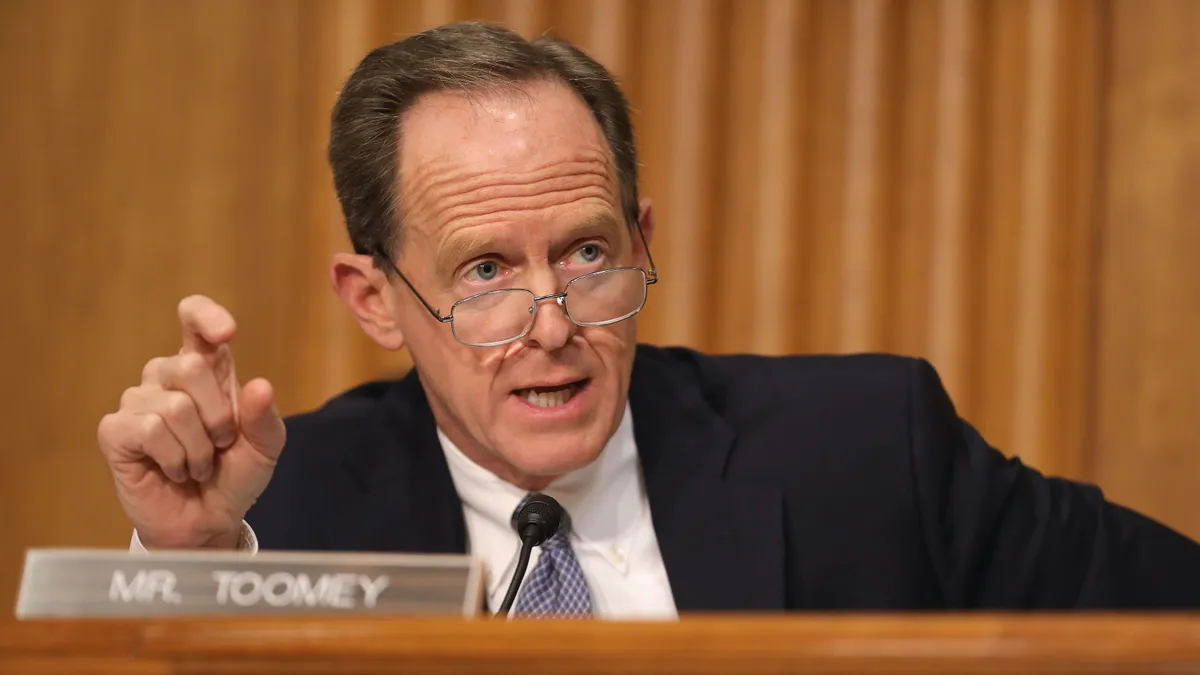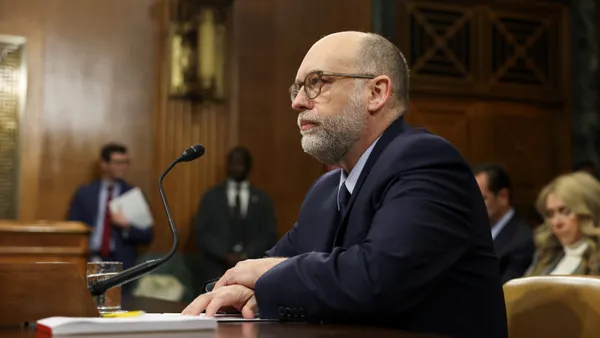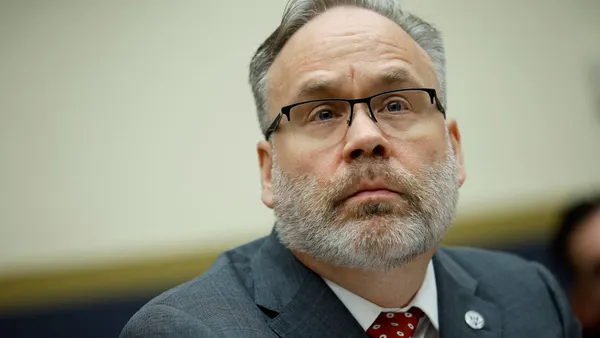Sen. Pat Toomey of Pennsylvania and three other Republicans on the Senate Banking Committee renewed their call to “reform the regional Fed banks to make them more transparent and accountable to Congress,” according to a letter they sent Tuesday to Kansas City Fed President Esther George.
Toomey earlier this month wrote George requesting information surrounding the circumstances by which a Colorado fintech, Reserve Trust, obtained a Federal Reserve master account — allowing the company to move money through the Fed system without using a bank.
In her own letter June 16, George assured Toomey she felt fairness and transparency were important, but “these principles must also be applied to the expectation of confidentiality of information that private citizens and companies provide to us, as well as highly sensitive confidential supervisory information belonging to the Federal Reserve Bank of Kansas City and its regulatory counterparts.”
“In that regard, I am not able to provide the documents you’ve requested,” she wrote. “With regard to [Reserve Trust] specifically, I assure you we did not depart from a deliberative and thorough analysis of associated facts and risks in conjunction with other regulators.”
During a February nomination hearing for onetime Fed vice chair nominee Sarah Bloom Raskin, Sen. Cynthia Lummis, R-WY, implied Raskin helped Reserve Trust gain the master account in 2018, after the Kansas City Fed had rejected the company’s first application. Raskin, a former Fed governor, served on the fintech’s board at the time.
Raskin repeatedly refused at the hearing to say whether she called the Kansas City Fed on Reserve Trust’s behalf. She later submitted a written statement to Toomey indicating she did “not recall any communications I made to help Reserve Trust obtain a master account.”
Toomey refuted that in a February letter, claiming that George herself told him Raskin made the 2017 call directly to her.
The master account narrative helped torpedo Raskin’s nomination — and pushed the Fed to suggest a new process for reviewing requests for access to master accounts.
Tuesday’s letter — signed by Sens. Tim Scott, R-SC, and Thom Tillis, R-NC, in addition to Toomey and Lummis — blasts the Kansas City Fed for what the senators call “unusual treatment” regarding Reserve Trust.
The fintech, for a time, was the only company of its kind to hold a master account. The Kansas City Fed has since revoked Reserve Trust’s access “after determining, among other things, that the company is no longer eligible for one,” Toomey wrote in his June 8 letter to George.
“Your letter asserts that the Kansas City Fed ‘has acted appropriately and ethically in decisions related to [Reserve Trust]’ … but you have repeatedly rebuffed any attempt to subject your claim to public scrutiny,” the four senators wrote George on Tuesday, noting that the Fed has sought public comment twice on its master account access protocol over the past 13 months.
“By continually stonewalling Congress, you have essentially asserted that the Kansas City Fed is not subject to any oversight by Congress or the public,” the senators wrote. “Unfortunately, this type of obstructionism has become too common a response from the Kansas City Fed, other regional Fed banks, and the Fed itself.”
The senators were not alone in flagging George’s June 16 response to Toomey.
“This kind of blanket denial of information to a member of Congress on so bizarre an episode, on the basis of confidential supervisory information, is very troubling,” Peter Conti-Brown, an associate professor of financial regulation at the University of Pennsylvania, tweeted this month.
The senators Tuesday said George “wrongly” asserted that the information Toomey requested about Reserve Trust’s master account was confidential.
“You specifically told Ranking Member Toomey on a February 7, 2022, phone call that this information was not [confidential supervisory information] because the Kansas City Fed is not a supervisor for Reserve Trust,” the senators wrote to George. “Three of Ranking Member Toomey’s staff members were also on that call and retained contemporaneous notes of it. The credibility of your assertion that the Kansas City Fed acted appropriately and ethically is diminished when your latest letter appears to mislead Congress and the public.”
George is set to retire from the Kansas City Fed in January.













